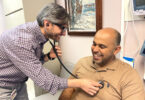Cindi Wheeler, a nurse practitioner in Sunnybrook’s TAVI (Transcatheter Aortic Valve Implantation) Clinic, has guided thousands of patients with heart valve conditions.
“Coming to the hospital for a discussion on next steps in your care can be very daunting, for both patients and their loved ones,” says Cindi, who is part of a team who perform over 450 TAVIs a year, providing patients with a new heart valve without open heart surgery.
Cindi recently joined a Sunnybrook Speaker Series event on heart valve interventions, and shares her advice on how to prepare for your hospital appointment – whether for a TAVI procedure or something else:
What to bring
- A support person or loved one – someone who will be there for you before, during and after any procedures or appointments
- Your Ontario health card
- Questions you have about a procedure, preparation for your hospital stay, as well as what life will look like when you’re back at home
- Medications you’re taking, including the names of any supplements and vitamins you take
- A list of prior surgeries and the dates they occurred
- Names and contact details for the medical providers you see regularly
What to think about
Cindi stresses that patients and their health-care teams should embrace something called ‘shared decision making’. This means you share your preferences, values, beliefs, and personal circumstances with your health-care team, and they, in turn, share their expertise about treatment options, including risks and benefits. Then, you work together to determine the best care and treatment plan.
Cindi says she often asks questions like:
- What brings you joy?
- How you want to live your life?
- What you want if your health becomes poor, including if you may need an emergency lifesaving procedure?
- Who can make decisions on your behalf?
- What types of medical procedures you would want, or not want?
Avoid “Dr. Google”
Online health information can be overwhelming, and Cindi says much of it won’t be about your individual health and case. Every person is different, and your care team will take into account your personal preferences, your anatomy, and test results before recommending a procedure or surgery. The best place to get health information is from your own health-care team, and the online resources they specifically recommend for you.
Preparing for your procedure with thoughtful planning and open communication can help reduce anxiety and make sure you feel ready. Your health-care team is there to guide you through the process and support you every step of the way.








